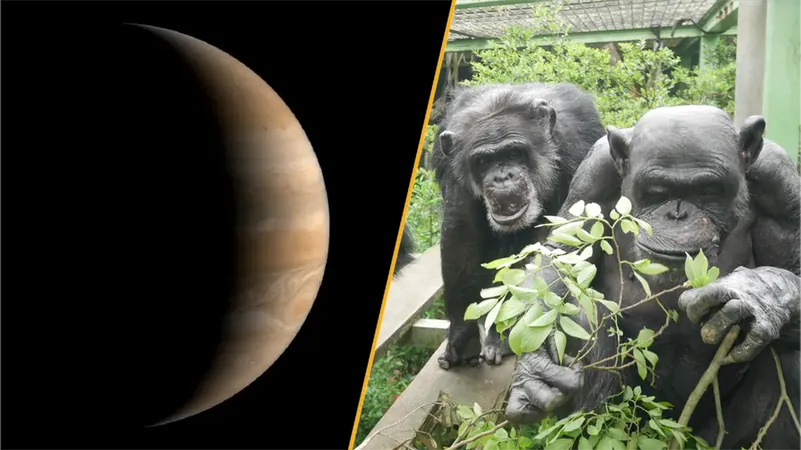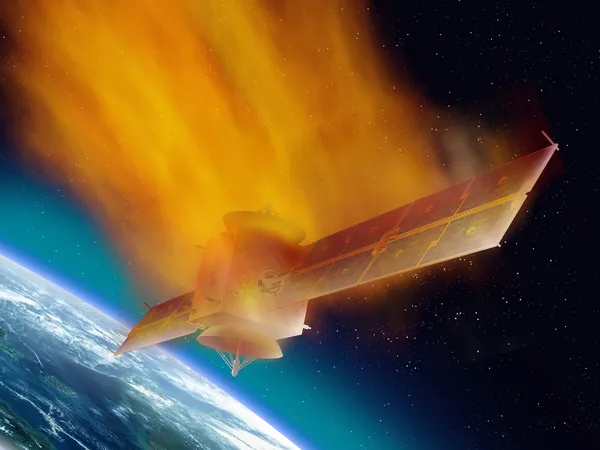
This Week in Science: Unbelievable Discoveries from Contagious Peeing to Cosmic Shifts
2025-01-25
Author: Daniel
Contagious Peeing in Chimpanzees
This week’s science news has unveiled a fascinating range of discoveries that stretch from the quirks of animal behavior to the mysteries of our cosmos. One particularly eye-catching study highlights a curious phenomenon known as "contagious peeing," revealing that not just humans, but chimpanzees also react to each other’s bathroom habits, potentially hinting at deep-rooted evolutionary traits that shape social interactions.
Divorce Rates Among Penguins
In another quirky wildlife revelation, researchers have discovered rather surprising "divorce" rates among the world’s smallest penguins. These adorable birds showcase complex social dynamics that challenge our perceptions of animal relationships.
New Species of Venom-Spraying Scorpion
On a more serious note, a new species of venom-spraying scorpion has been identified in South America, adding to the biodiversity of the region. Researchers were also taken aback to find that one of Australia's most notorious spiders is not one but actually three distinct species, showcasing nature's knack for surprises.
China's Nuclear Fusion Breakthrough
Meanwhile, in groundbreaking energy news, China has set a new nuclear fusion record at its Experimental Advanced Superconducting Tokamak (EAST), often called the "artificial sun." Scientists achieved a stunning feat by maintaining plasma at temperatures six times higher than the sun's core for a remarkable 1,066 seconds. This breakthrough is a significant step toward harnessing fusion energy, which could provide virtually limitless clean energy for the future. However, while this milestone is exciting, much work lies ahead before commercial fusion becomes a reality.
Ancient Interstellar Object and Solar System Formation
In astronomical news, researchers have posited that an ancient interstellar object, possibly eight times the mass of Jupiter, might have mysteriously influenced the orbits of the four outer planets—Jupiter, Saturn, Uranus, and Neptune—around 4 billion years ago. This theory helps unravel long-standing questions about the formation of our solar system.
Impact of Organ Donation
In other riveting science reports, the impact of organ donation is highlighted, as over 46,000 organ transplants were carried out in the U.S. last year alone. Scientists ponder whether organs could be reused after a transplant, suggesting an innovative solution to the ongoing donor shortage crisis.
Neanderthals' Blood Types and Extinction
The week has also brought attention to a critical study linking Neanderthals' blood types to their eventual extinction, indicating that genetic incompatibility may have played a role in their population decline.
Solar Storms and Auroras
And for those curious about space, expect a celestial show! Solar storms may bring spectacular auroras across parts of the United States this weekend, presenting a perfect opportunity for skywatchers to witness nature’s breathtaking displays.
Conclusion
Stay tuned for more extraordinary discoveries and updates from the frontiers of science that leave us questioning our understanding of the world!


 Brasil (PT)
Brasil (PT)
 Canada (EN)
Canada (EN)
 Chile (ES)
Chile (ES)
 Česko (CS)
Česko (CS)
 대한민국 (KO)
대한민국 (KO)
 España (ES)
España (ES)
 France (FR)
France (FR)
 Hong Kong (EN)
Hong Kong (EN)
 Italia (IT)
Italia (IT)
 日本 (JA)
日本 (JA)
 Magyarország (HU)
Magyarország (HU)
 Norge (NO)
Norge (NO)
 Polska (PL)
Polska (PL)
 Schweiz (DE)
Schweiz (DE)
 Singapore (EN)
Singapore (EN)
 Sverige (SV)
Sverige (SV)
 Suomi (FI)
Suomi (FI)
 Türkiye (TR)
Türkiye (TR)
 الإمارات العربية المتحدة (AR)
الإمارات العربية المتحدة (AR)